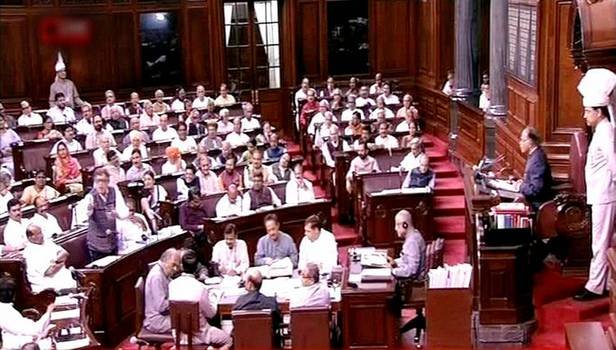Rajya Sabha Passed GST Bill After Lok Sabha
06 Apr 2017 ( IBTN News Bureau )
Parliament has approved four bills related to commodity and service tax, while paving the way for implementing GST in the country's historical tax reform regime.
At the same time, the Government assured that the interests of consumers and states in the new tax system will be fully protected and tax on agriculture will not be levied.
The Rajya Sabha today discussed the Union Goods and Services Tax Bill 2017, the GST Bill, the Integrated Goods and Services Tax Bill 2017, the IGST Bill, the Union Territory of Goods and Services Tax Bill 2017, and the 'Goods and Services Tax to the States' bill 2017. After returning the Lok Sabha with a vow. The Upper House rejected the amendments of the opposition brought on these bills.
Due to the money bill, these four bills had the right to discuss only in the Rajya Sabha. The Lok Sabha has approved these bills on March 29.
Responding to a discussion on the Bill of Goods and Service Tax, Finance Minister Arun Jaitley said that these doubts of the Opposition are inexplicable, that in accordance with these bills, agreement with the rights of Parliament is being done in the matter of taxation.
He said that the first thing is that this Parliament has given the right to recommend the rate of tax to the GST Council by amending the Constitution.
Jaitley said that the GST Council is the first federal decision making body. On the basis of the constitutional amendment, the GST Council was given the right to form Model Law. As far as the law is concerned, it will be on the basis of federal structure, while the supremacy of Parliament and State Legislatures will continue. However, these recommendations will be kept in mind, because different states will set a different rate if there is a chaotic situation. This is a cordial interpretation of it and no other meaning should be drawn.
He said that by amending the Constitution, it has been ensured that it will be the only tax in the country to collect the state and the centre together. Explaining the situation on objections about having several tax rates instead of making a similar tax, the Finance Minister said that there are many food products which are now zero tax and there will be no tax after the GST system is implemented. There are many things that can not be taxed at the same rate. Rates such as tobacco, alcohol etc. are high, whereas clothing has a normal rate.
Jaitley said that during the discussions in the GST Council it was decided that many taxes will be simplified initially. The Finance Minister said that after the deliberations, the GST Council has fixed rates of 0, 5, 12, 18 and 28 per cent in GST system. It has also been said to put additional cess on material, such as luxury cars, bottled drinks, tobacco products and environmental related items like coal.
He said that the cess cost of more than 28 per cent will go to the fund and the states which are being damaged will be given the amount. There was also a suggestion that it should be applied as tax. But by applying as tax, there is an impact on consumers. However, additional taxes will not be levied on consumers.
Jaitley said compensation will be given to those states who are suffering from GST system implementation. It will be for the first five years. He said that Congress-led United Progressive Alliance government could not get a consensus on GST as no loss was given to the loss-making states for compensation. The provision of compensation in GST was 'helpful in the deal' and the state came together
Giving a clarification on the objection of several members after not including the real estate sector in GST, the Finance Minister said that this is an area in which the states get substantial revenue. It has revenue from the Registry and other tariffs, which is why it has not been included in GST on the basis of the opinion of States. He also clarified that the centre's vote is only one-third to take any decision in the GST Council whereas two-thirds of the votes are for the states. Therefore, while making any decision, the Centre is not in favour of imposing its own opinion.
Terming the first federal contract to get the constitutional clearance of goods and services tax, Jaitley said that, without putting any extra tax on consumers, there would be a way to implement a system of 'one nation, one tax' in the country through GST. The Finance Minister said that the GST Council is deciding the tax structure with unanimous consent and so far 12 meetings have been held in this regard. This bill is based on the principle of common sovereignty between the Centre and the State Governments and it is such a first initiative.
Upon the implementation of GST, the excise duty, service tax and value added tax (VAT) in the states will be included in it, along with several others. Jaitley, while clarifying the bills, said that the Centre has the right to tax in the event of the removal of the excise duty, service tax and additional customs duty through the central GST bill. Through the coordinated GST or IGST, there will be the right to tax the Centre on the movement of goods and services in states.
While clarifying the position regarding the provision to prevent profits in respect of tax exemption, the Finance Minister said that if 4.5 percent tax exemption is given, then it does not mean that it should be considered as a personal profit but the benefit should be given to the consumers. This is the intention of this provision.
The Finance Minister said that the situation was similar to liquor and petroleum products just like real estate. After discussions with the states, petroleum products have been brought under its purview, but it has now been kept under zero rate. The GST Council will consider it. Alcohol is still out of its scope.
The Finance Minister said that the first person had to go to many evaluation agencies for business. To pursue economic activities, it had to go through excise duty, service tax, state VAT, entertainment tax, entrance fees, luxury tax and many other taxes.
The Finance Minister said that there was no smooth flow of goods and services in the country. In this way, the GST system was further extended. Do such a tax where there is an evaluation officer. Most self-assessments and only limited appraisal except for audit matters.
Jaitley said that tax is taxed, which increases the trend of inflation. Therefore, the idea of making a market for the whole country. It came to be that simple arrangements should be brought inside the country. Describing agriculture to be brought under the purview of GST, the Finance Minister said that agriculture and farmers do not require registration. Under section 23, exemption is granted to farmers and agriculture. Therefore, it is kept in definition for interpretation of this exemption. There should be no confusion about this. Jaitley said that there should be no confusion about agricultural product when it is zero rate.
Dismissing Congress's objections about this, Jaitley said that 29 states, two union territories and the Centre considered this, including eight finance ministers of the Congress-ruled state. "Then did all these conspired against a particular class?" After dismissing the fears of an increase in the prices of commodity and commodities after the GST was imposed, the Finance Minister said that the rate of tax will be kept at the present level. It has no impact on inflation.
Jaitley said that the Jammu and Kashmir Legislative Assembly will bring a legislation about GST. He said that the Finance Minister of Jammu and Kashmir participated in all the meetings of the GST Council.
The Upper House rejected the draft of Trinamool Congress' Derek O'Brien, it said that all decisions of the GST Council should be approved by the Parliament.
(Click here for Android APP of IBTN. You can follow us on facebook and Twitter)
Share This News
About sharing
-
 16 Sep 2025
UN inquiry finds Israel’s war on Gaza to be genocide
16 Sep 2025
UN inquiry finds Israel’s war on Gaza to be genocide
UN inquiry finds Israel’s war on Gaza to be genocide
-
 16 May 2025
Has Donald Trump taken US-Gulf relations to a new era?
16 May 2025
Has Donald Trump taken US-Gulf relations to a new era?
Has Donald Trump taken US-Gulf relations to a new era?
May 16, 2...
-
 16 May 2025
What do the Gulf states gain from the US president's historic trip to the region?
16 May 2025
What do the Gulf states gain from the US president's historic trip to the region?
What do the Gulf states gain from the US president's historic trip to the regio...
-
 15 May 2025
Pakistan FM: US didn't force the ceasefire with India | Talk to Al Jazeera
15 May 2025
Pakistan FM: US didn't force the ceasefire with India | Talk to Al Jazeera
Pakistan FM: US didn't force the ceasefire with India | Talk to Al Jazeera
-
 15 May 2025
How will the lifting of US sanctions help Syrians rebuild their country?
15 May 2025
How will the lifting of US sanctions help Syrians rebuild their country?
How will the lifting of US sanctions help Syrians rebuild their country?



